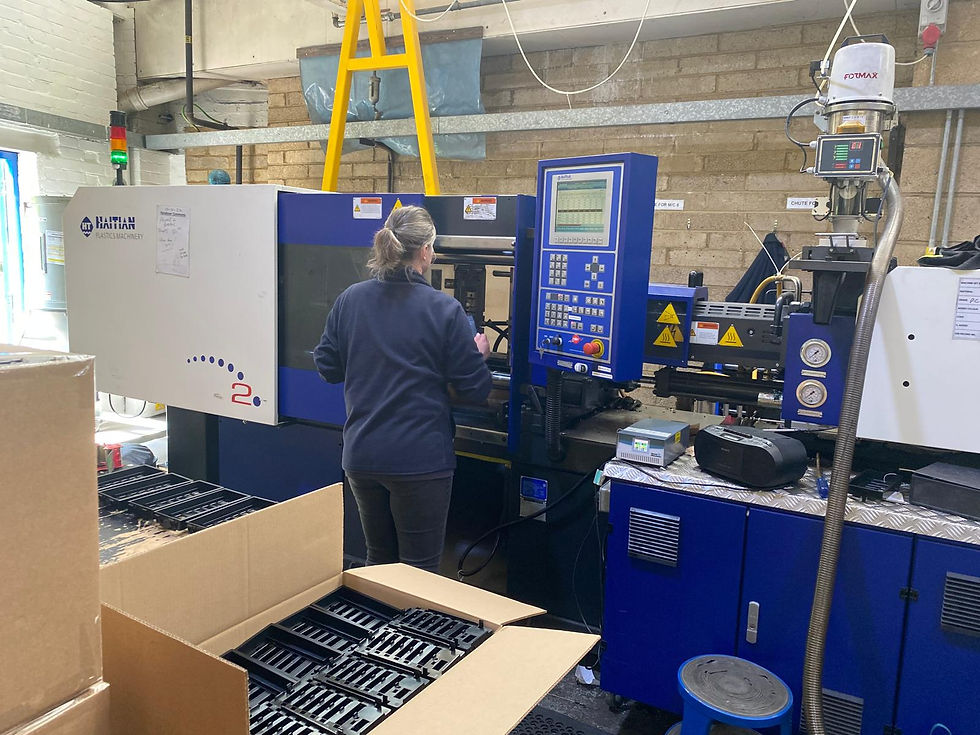Key Factors that determine the cost of Plastic Injection Moulding
- alisonpitt
- Oct 28, 2021
- 3 min read
Updated: Jul 5, 2024

With 40 years of experience in the business, one of the most frequent questions we receive from our clients is:
"What are the key factors that will influence the cost of my injection moulding project?"
In this blog article, we will explore the main aspects that drive the cost of a plastics injection moulding project.
The most significant up-front cost within your plastics injection moulding project will always be the tooling element. Tooling costs can range from anywhere between £4,000 - £20,000+. Whilst this is undeniably a high investment cost, it is imperative to remember the following key points:
1. The mould tool is at the heart of the manufacturing process, it is therefore essential that the tool is designed and constructed properly to efficiently produce your parts throughout the life of your project.
2. The cost of the mould tool should be amortised throughout its lifetime as the cost is distributed amongst hundreds or thousands of parts. Thus, plastics injection moulding is an ideal process to mass-produce plastic component parts affordably.
Part Size
The part price is largely determined by the machine used and the cycle times needed to produce the part. Larger moulds that use for example 250-ton lock machines require additional set-up time which subsequently increases the cost. Cycle times are governed by the wall thicknesses, part size and complexity which increases machine & material use and has a cost impact on the part.
If a part is larger, it will require a bigger mould tool, which often takes longer to manufacture. Additionally, if the part has more cavities, you will likely need a larger press size, which increases costs such as electricity, setup expenses, and space. However, it's worth noting that the savings from increasing the number of cavities should offset the cost of upgrading the injection moulding press size.
Complexity
Each plastic moulded component will vary in design and complexity. A detailed part may necessitate locally hardened inserts or a fully hardened cavity. Specialist surface finishes can also add to the costs. These elements contribute to the overall plastic moulding expense; simply put, the more complex the mould design, the higher the cost.
A complicated tool with side actions or unscrewing mechanisms will reduce the unit cost but increase the tool cost. A commercial decision must be made regarding whether to perform secondary operations or design a fully automatic tool.
Customization
Different products have various customization needs, such as surface texture, colour dyes, stamping, and other aesthetic features.
The fewer customizations required for the moulded part, the more you will save on costs. Therefore, it is crucial to carefully evaluate the necessity of each aesthetic finish before implementation. Reducing these requirements is an effective way to lower the overall cost of the project.
Material Selection & Quantity
A large proportion of the plastic injection moulding costs are dependent on the type of plastic material and the quantity that you use.
An extensive range of plastics are available for injection moulding, from polypropylene, polycarbonate, and ABS, to nylon. These polymers offer product designers a broad choice of colours, chemical & mechanical properties.
Before you decide which material, you want to use, consider the application of the plastic component part. Evaluate the essential features needed within the part to get optimal functionality. Research your options to see whether you can achieve it with a lower-end polymer. Sometimes, lower-end polymers with some fillers and additives work equally well as a higher-end material.
We hope you found this blog post interesting. If you are considering plastic injection moulding for your component part, why not schedule a free consultation with us? As experts in plastic injection moulding, we work closely with our clients to understand their unique requirements, objectives, and challenges.
To arrange your consultation, call us at 01453 833 388 or email us at tradesales@pnplastics.co.uk.





Comments